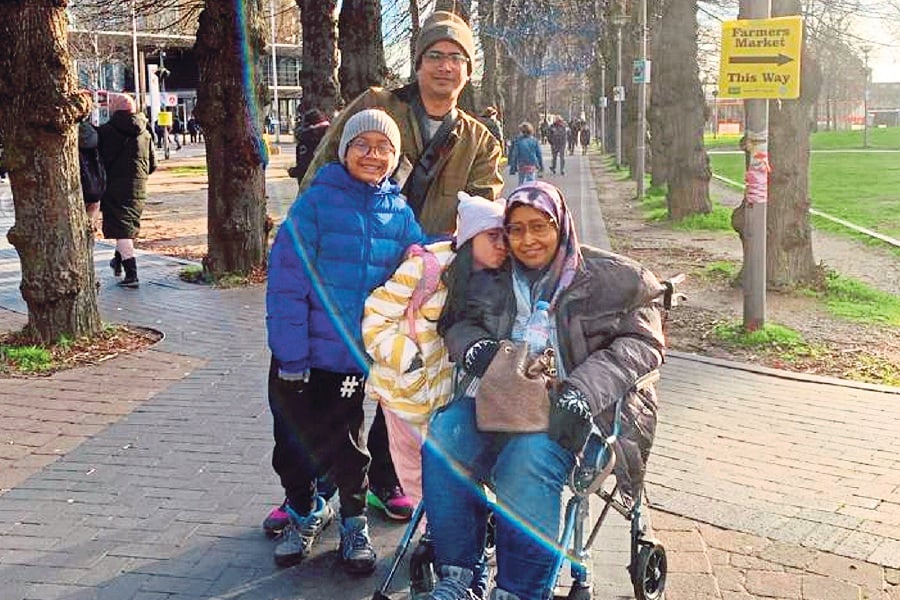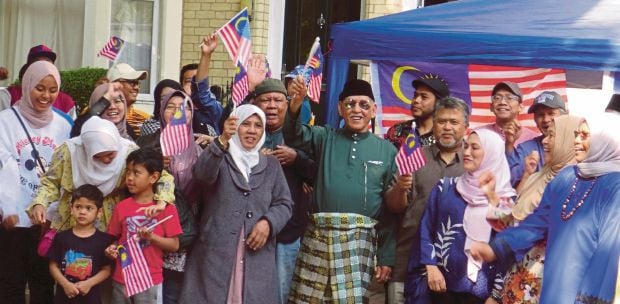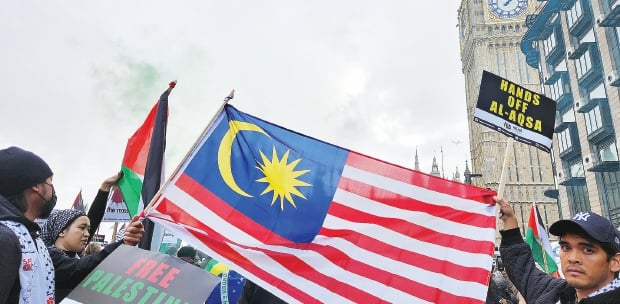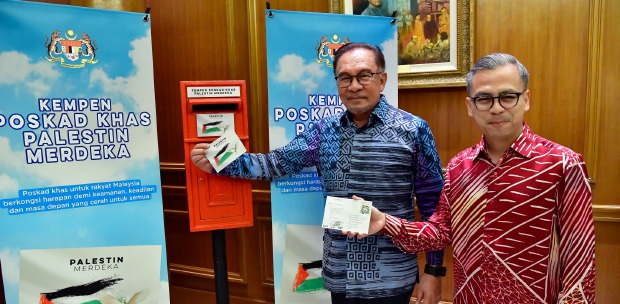LONDON: The burial of Siti Nor Hafiza Kamarudin finally took place in Malay-sia, marking the end of a poignant chapter in the life of the late entertainment journalist. She died at a London hospital, 10 days after collapsing just minutes before boarding her flight home.
Paramedics had rushed her to Charing Cross Hospital, where doctors delivered the devastating news to her distraught husband, Mohd Roshdi Ramli, that she had only "one or two days to live".
They were unable to intervene significantly due to the aggressive spread of cancer from her breast to her liver and then to her brain.
However, the aggressive spread of cancer led to her death in just a few hours.
Upon receiving the news from Roshdi, I arrived at the hospital, where I found the atmosphere strangely familiar.
In the summer of 2016, Mohamad Sahar Mhd Noor, who was in London for his daughter's graduation, collapsed at Heathrow Airport upon arrival.
Three years later, Sahrom Ahmad, also in London for his daughter's graduation, suffered a stroke.
Both received treatment at the same hospital but were lucky that they made it out alive and were flown home to recuperate.
Adding to the eerie sense of déjà vu was the immediate presence of familiar faces, strangers ready to provide support.
Ed Adeeb, renowned for his tireless efforts assisting Malay-sians during the Covid-19 lockdown through the Malaysian Quarantine Support Group on Facebook, drove all the way from Birmingham upon learning of the news through a friend. Several officers from the high commission were also present.
Accompanying me was my newfound friend, Amber Sabbah, who volunteered to look after Roshdi's children, Riyadh, 10, and Raisya, 8, if the need arose.
Amber, an American-Palestinian, marvelled at the overwhelming show of support during this difficult time for the young family.
COMPASSIONATE RESPONSE
It could be argued that the late Fiza received assistance not only from her homeland in Malaysia but also abroad due to her work at RTM, Astro and as a staff member at portals Boom Malaysia and Jurnal Malaysia, both owned by KRU Media.
However, that is not quite true. In most cases that I know, the Malaysian community is always ready to offer a helping hand.
In one case, the daughter of one of the stroke patients found herself in a bewildering situation when her father was hospitalised, and bills began to accumulate.
Desperate to transport her father back home, she inquired about securing a single bed that could fit on a plane.
This plea ignited a compassionate response from people who formed a volunteer group to help.
Others contributed advice and guidance while others offered either cash or through GoFundMe. Malaysian restaurants provided food for the family, and others extended offers of assistance.
Facing such a predicament while abroad is daunting. Without individuals familiar with the local system, language and protocols, those left behind often find themselves struggling.
The initial point of contacts in such situations are usually the Malaysian embassy or high commission.
While they may not offer direct financial aid, they can guide people in the right direction. Embassy officers often go beyond their official duties to provide assistance.
Within the Malaysian community abroad, there are professionals such as doctors and lawyers who help with tasks like communicating with hospitals, obtaining medical reports to expedite processes like burials or repatriation if requested.
In Fiza's case, dealing with the hospital authorities to get the relevant reports was Dr Fahja Ismail.
Despite being on a much-needed year-end break, Dr Fahja, who had volunteered her time with previous cases like the stroke victims and baby Ainul seeking cancer in the mouth treatment in London, spoke to Roshdi.
She provided advice on expediting the medical report, facilitating the registration of death, and obtaining a death certifi-cate.
Only then could they proceed with arrangements involving funeral directors who would then coordinate with the airlines.
However, due to the Christmas and New Year holidays, the process faced delays.
This should, in part, address the frequently asked questions from Malaysians back home on "why has it taken so long".
According to Dr Fahja, a long chain of people is involved from the time of death to the issuing of the death certificate.
"Delays can happen at any stage. Offices are closed during weekends, evenings and bank holidays. If a patient dies on Monday morning, the process can be started after 8am on that day.
"The death will likely be registered on the same day, if everything is straightforward.
"But if death occurs on a Friday evening of a long bank holiday weekend, they have to wait until the next working day.
"That is why it's very important to have someone who knows the system and help with communicating and liaising with these people."
Hospitals in the United Kingdom normally understand that Muslims need to be buried as soon as possible.
However, delays often happen especially when there is no coroner to sign the certificate.
BURIAL OR REPATRIATION
Many Malaysians who have been in this situation would be familiar with Hj Taslim Funeral Directors, located close to the East London Mosque.
Once the certificate is issued, they will collect the remains to be washed, usually by volunteers and prepared for burial or repatriation.
Hj Taslim Funeral Directors is usually in contact with Malaysia Airlines once the remains are ready to be repatriated.
The next of kin usually prefer that the remains be flown directly home.
Others will choose to have the burial here, where the Garden of Peace is usually the common one.
Again, this will be organised by Hj Taslim Funeral Directors or other preferred funeral directors.
Usually on hand to offer the assistance with the preparation and burial is Haji Ilyas Sidek, a local staff member at the Malay-sian high commission, or Ustaz Zaki Ismail, of the Suffa Educational Foundation in London.
Malaysians holidaying in the UK also needs to be mindful of their travel and medical insurance.
And to help read the fine print is Dr Sharifah Faridah Syed Alwi, a lecturer at a university here who has helped many understand the terms and conditions and even liaised with the insurance company.
While the victims' employers come up with some financial aid, exorbitant hospital bills need to be claimed from the insurance company.
Generous Malaysians can always be depended on to help a fellow countryman in their darkest hours.
Roshdi was lucky as he and his young family received help from strangers who became friends, meeting them before their departure at the tahlil session in Malaysia Hall.
"The Malaysians here have been amazing. There are protocols and systems here that we have to follow, but without their help and assistance to make me understand them to expedite the process, it would have been difficult," said Roshdi.
It was a sentiment shared by many in similar circumstances. Roshdi is not alone, and he felt lucky that he was able to fulfil his wife's last wish to holiday in London and then take her home to her final resting place.






